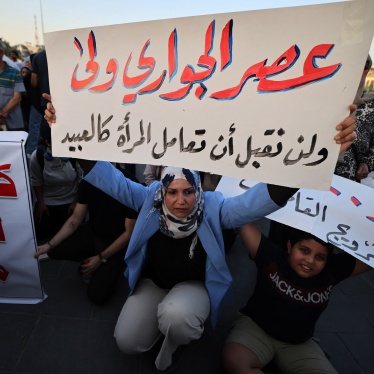At 9 years old, a girl should be in primary school. She is not old enough to drive a car, vote or hold a job, but according to some Iraqi lawmakers, she is old enough to be in a wedding dress.
Despite widespread protest and condemnation in Iraq, some Iraqi parliament members continue to try to push forward an amendment that would upend the country's Personal Status Law. In effect, it could legalize child marriage for girls as young as 9 and boys as young as 15, undermine the principle of equality before the law and remove protections for women regarding divorce and inheritance.
This amendment is the latest in a series of attacks by certain political leaders in Iraq against women's rights and gender equality issues. Already, they have succeeded in criminalizing homosexuality, banning use of the word "gender" and stalling passage of a draft domestic violence law. These attacks have forced Iraqi women's rights activists to defend the limited rights they already have, instead of pushing for more.
Iraq's Personal Status Law, which governs matters of marriage, divorce, child custody and inheritance for Muslims in Iraq, was considered one of the most progressive in the region at the time of its adoption in 1959, and it still is today. It was the result of negotiations within the nascent Iraqi state between women's groups and anti-imperialist factions, mobilizing against the vestiges of British colonial rule, who wanted one unifying law for all citizens regardless of gender, sect or religion, and certain religious factions, who wanted each sect to govern its own personal status affairs.
The compromise was a civil law rooted in interpretations of Islamic law agreed upon by both Sunni and Shia Islamic scholars that would apply to all Iraqi Muslims regardless of their sect.
Just one page long, the draft amendment now moving forward in Iraq's parliament would overturn this equilibrium entirely by allowing couples signing a marriage contract to choose whether the provisions of the Personal Status Law or the provisions of specific Islamic schools of jurisprudence would apply. Sect, not citizenship, would dictate which rights Iraqis are afforded in their personal life, effectively establishing separate legal regimes for different sects and further entrenching sectarianism in Iraq.
Article 14 of the Iraqi constitution, as well as international human rights law, guarantee all Iraqis the right to legal equality. This amendment would not just undermine this right; it would erase it.
In practice, passing this amendment would mean that one girl in Iraq may be protected from child marriage, while her classmate is forced into it. One daughter could inherit land after her parents' passing, while her neighbor is denied this right. After her husband requests a divorce, one woman would be allowed to stay in the marital home for three years, while her neighbor would be put out on the street.
Iraqi women wouldn't be allowed to choose the legal regime that best protects them, either. The draft law explicitly states that in the event of a dispute over which sect's law should apply, the sect of the husband takes precedence—a provision that clearly violates Iraq's obligations under international law to uphold equal rights for women.
Though they are still prevalent in Iraq, marriages conducted by religious leaders and never registered with the Personal Status Court are illegal today. The draft amendment would legalize these unregistered marriages, and allow religious leaders, rather than the courts, to finalize marriages. Amending the law in this way would institutionalize and entrench a problem that Iraq is already struggling to overcome, and erase the progress that has been made toward ending unregistered marriages.
Unregistered marriages are already a loophole enabling child marriage in Iraq, where the Personal Status Law currently sets 18 as the minimum age for marriage. In 2023, UNICEF reported that 28 percent of girls in Iraq are married before the age of 18. According to a 2021 report by the U.N. Assistance Mission in Iraq (UNAMI), 22 percent of unregistered marriages involved girls under 14.
Unregistered marriages also have extremely harmful effects on women and girls' ability to obtain government services, register their children's births and claim their rights. Without a civil marriage certificate, women and girls are unable to give birth in hospitals, itself an unjust obstruction to health care. Instead, they are forced to give birth at home with limited access to emergency obstetric services. This increases the risk of medical complications that threaten the life of both the mother and her baby. Children and young women are especially vulnerable to some pregnancy complications; married girls often face health risks due to early and closely spaced pregnancies.
Beyond dismantling hard-won protections for women's rights and legal equality in Iraq, this amendment could change the social fabric of the country at a time when sectarian tensions run high and stability remains precarious. Such a fundamental change demands thorough debate, consultation and engagement at all levels of society. This hasn't happened.
In fact, Iraqis don't even know what the law that parliament is voting on will ultimately look like. Instead, the amendment gives religious institutions six months to develop a "code of Sharia [Islamic law] rulings on personal status matters"—an incredibly broad remit—and then submit it to parliament for approval, bypassing any public review.
Meanwhile, Iraqi lawmakers who support the amendment loudly declare that the bill is what's best for their constituents by giving them "freedom of choice," claiming they are defending Iraq against the imposition of secular Western values.
Yet the pushback against the amendment has not come from abroad. Rather, it has been spearheaded by Iraqi women themselves. Iraqi women in parliament from across the political spectrum have joined forces to fight against passage of this amendment, just as it has been Iraqi women—and men—on the streets protesting attempts to strip them of their rights.
It was the tireless organizing of these women, not foreigners, that resulted in the Iraqi parliament postponing the second reading of the bill, initially scheduled for September 3, because of a lack of a necessary quorum. It was Iraqi women who successfully advocated for passage of the Personal Status Law back in 1959, too.
But earlier this week, on September 16, Iraq's parliament held the second reading of the bill, moving a step closer to passing it. Next, parliament will formally debate the amendments and then put them to a vote. Lawmaker Noor al-Jilaihawi said the parliament president refused to receive a request signed by 124 MPs—or over a third of the legislative body—to remove the reading from parliament's agenda.
A survey conducted in August by the Iraq Polling Team, an Iraqi NGO, found that 73.2 percent of the 61,648 respondents were strongly opposed to amending the Personal Status Law. The same poll found that 81.6 percent of respondents preferred a civil Personal Status Law to a sectarian one.
Iraqi political leaders have tried and failed to pass this law multiple times since the American-led invasion that toppled Saddam Hussein's regime in 2003, but they are more influential today than they were then. Nevertheless, elected representatives are supposed to represent the will of their constituents, and many of their constituents have made their views clear. Should this bill pass now, it would speak volumes about the sorry state of Iraq's democracy and its respect for human rights—and it will be women and girls who pay the heaviest price.









